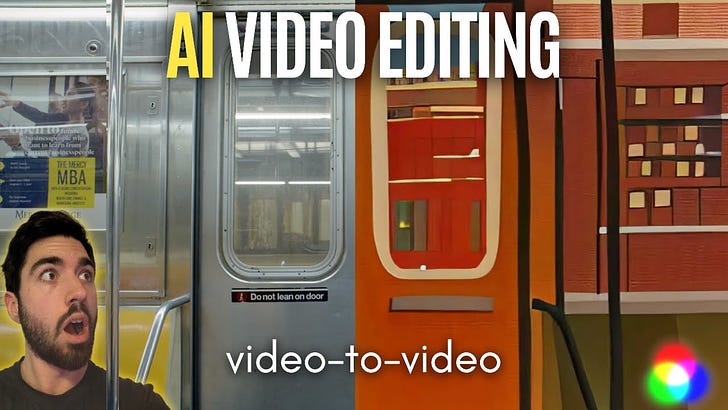Good morning fellow AI enthusiast! This week's iteration focuses on Gen-1. Runway's new model for video-to-video editing. Meaning taking a video and transforming its style into another video like a cartoonifier or, even better, taking a mockup and transforming it into a fully stylized movie scene! We hope you enjoy it.
1️⃣ Gen-1, the future of storytelling?
Runway have created a system called GEN-1 that can take a video, and apply a completely different style to it in seconds. The model is a work in progress and has flaws, but still does a pretty cool style transfer from an image or text prompt into a video, something that would've been impossible a few years or even months ago. Even cooler is how it works...
Watch the video to see more results and how it works:
2️⃣ [Sponsored] Sign up for Convergence: a 2-day virtual event on MLOPs
Join us and 25+ data science experts for a free virtual event to hear how companies like Gong, Syngenta, Wayfair, and others approach machine learning to solve their business problems. From training stable diffusion on CPUs to QA on AI systems, there's so much to learn. See you there!
3️⃣ AI Ethics with Auxane Boch
Generative AI has the potential to revolutionise many industries in both positive and negative ways. Today, we will discuss the film industry!
First, let’s dive into the ethical concerns brought by such technology. As AI will generate content based on a specific dataset it was trained on, its output might perpetuate harmful stereotypes or misrepresentations, which could then lead to negative societal impacts. This issue usually arises from a bias present within the training data that is simply amplified by the AI. We here have to remember that as much as it is called ‘intelligent’, AI knows only what it knows. For example, an AI system trained on a dataset that is predominantly white may generate content that portrays people of colour as criminals or in subservient roles. This highlights the importance of ensuring that the training data used for AI-generated content in the film industry is diverse and representative of different races, ethnicities, and cultures, in order to avoid perpetuating harmful stereotypes and misrepresentations. A second concern relates to the fear that AI-generated content could replace human jobs in the film industry or reduce the demand for human creativity - as discussed in this same ethics section in the past few weeks regarding other generative AI. These issues must be addressed carefully, and the industry should consider developing guidelines to ensure that AI-generated content is used in ways that are ethical and align with societal values.
Despite these concerns, there are many opportunities presented by generative AI in film-making! For example, the technology can be used to create more realistic special effects while reducing the cost and time required for post-production work. This could lead to a significant increase in productivity and creativity in the industry, while also democratising access to film-making tools. Independent filmmakers and those with limited resources may thus clearly benefit from the democratisation of access, which in return could help to create more diverse and inclusive films.
Ultimately, the use of generative AI in the film industry has to be approached with caution and care, as per usual when AI is involved, but it is important to recognise the potential it brings as well! The key is to balance the possible benefits with the risks, and to develop appropriate guidelines to ensure that its use aligns with societal values and does not cause harm. By doing so, the industry can harness the full potential of generative AI to create amazing films - and I can’t wait to see where this leads us!
I wish you all a great week! - Auxane Boch (iuvenal research consultant, TUM IEAI researcher).
4️⃣ I was in the AI Stories podcast by Neil Leiser !
In our conversation, we talked about What’s AI and how and why I launched the Youtube channel. We then explore the world of Research and AI Algorithms. We discuss some of the latest techniques, chat about what intelligence actually means and debate on whether AI algorithms are actually intelligent or not. We also dive into research papers and bits of advice on how to easily read and understand technical content. Finally, we talked about how I got into the field, the PhD, and more about applying computer vision for medical images.
We are extremely grateful that the newsletter is now read by over 12'000+ incredible human beings counting our email list and LinkedIn subscribers. Feel free to reach out to contact@louisbouchard.ai with any questions or details on sponsorships. Feel free to follow our newsletter at Towards AI, sharing the most exciting news, learning resources, articles, and memes from our Discord community weekly.
Thank you for reading, and we wish you a fantastic week! Be sure to have enough rest and sleep!
We will see you next week with another amazing paper!
Louis





